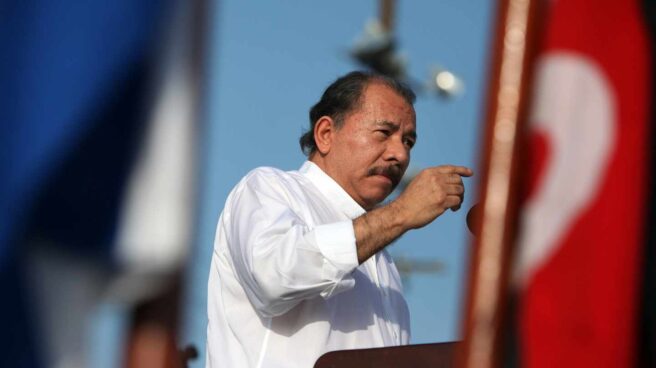

Daniel Ortega, President of Nicaragua
“A clean slate and a new account and let’s move on.” These words spoken Daniel Ortega in their own post-electoral fraud investments in November 2021, they predicted a trend towards the radicalization of the Nicaraguan dictatorship that has accelerated since the April 2018 protests.
The social consequences of this flight forward almost a year later are dramatic. Today, there are at least 195 people in Nicaragua who recognize themselves as political prisoners. Many of them, potential candidates for those November elections, were imprisoned and subjected to torture and solitary confinement for more than a year and a half.
His health deteriorated within the walls of Chipote, a Nicaraguan prison complex and veritable torture center. Here are some of the reasons why political prisoners Miguel Mendoza, Roger Reyes, Irving Larios D Dora Maria Tellez today add more than 22 days of hunger strike. In the meantime, the repression continues and extends to the families of dissidents in a new pattern that ranges from harassment and threats to imprisonment of family members in retaliation.
So far in 2022, the Ortega regime has revoked the legal personality of 2,242 Nicaraguan civil society organizations, in addition to 147 foreign NGOs. Since 2018, more than 54 independent outlets have been closed.
Meanwhile, the wounds from the April protests remain open. At least 335 people have been killed in connection with this, and their families continue to seek truth and justice. Thousands of young people in vulnerable situations have been injured and now face serious health problems due to a gap between the public health system that rejects them and the high prices of private health care that they have difficulty accessing.
The Ortega and their dictatorial apparatus have expelled thousands of young people from universities, depriving them of their future. Tens of thousands of Nicaraguans are rushing into unknown exile, often not knowing if they will be allowed to return to the homeland from which the regime intends to expel them. This new scheme, facilitated by airline collusion, leaves Nicaraguans who choose to return in a predicament on any scale. Foreigners in a random country, deprived of their homeland.
Meanwhile, the flight forward materializes in the international arena. The Ortega dictatorship is known to have feet of clay as well as to radicalize its isolation in the face of an increasingly apparent lack of regional and international support.
At the end of September, the dictatorship proclaimed persona non grata head of the EU Delegation to Nicaragua, Bettina Muscheidt. This unreasonable and unilateral decision was a blow to the table, Ortega’s hysteria in response to the calls of the Europeans once and for all to return the sovereignty of Nicaragua to the Nicaraguan people.
This week the EU responded proportionately by expelling Zoila Muller, representative of the Nicaraguan regime before European institutions. On the same Thursday, the EU renewed sanctions against Nicaraguan officials, including several of Ortega’s children and Rosario Murillo.
The OAS also approved a new resolution on October 7 condemning the regime’s repressive bias and proposed the establishment of a high-level commission to discuss “all pressing issues” with Managua.
Efforts must continue at all levels to find creative ways to support the people who are suffering today in Nicaragua and beyond. But the international community can never fall into Ortega’s trap. Dialogue with Managua cannot be at any cost.
Meanwhile, the dictator continues to strengthen ties with Russia. In the resolution adopted by the UN General Assembly on October 12 condemning the occupation of Ukrainian territories, only five countries voted against. Belarus, North Korea, Syria, Russia itself and… Nicaragua. Another vivid self-portrait of the dictatorship. Not surprisingly, after the April 2018 protests, Russia took pains to point out that the crackdown on Ortega was “purely an internal matter.” In just a month, two states will sign Memorandum of Intent on Consultative Cooperation, opening a closer channel of communication that also includes military support.
The Ortega know what we know: Nicaraguan civil society resists, monitors, exposes, informs, investigates.”
This flight demonstrates Ortega’s fear of the future, his desperate search for allies to stay afloat. The Ortega know what we know: Nicaraguan civil society resists, observes, condemns, informs, investigates. Despite the repression, he continues to find ways to organize. Our role is to be by your side.
It was the civil society, especially the 46/2 Collective, who, through their efforts, achieved the creation of an independent mechanism for accountability for the crimes of the dictatorship by the UN Human Rights Council. The recent announcement of the opening of an investigation by the Argentine Prosecutor’s Office against Ortega, Murillo and those responsible for the return or implementation of political and religious persecution, which paves the way for universal jurisdiction, is another triumph of civil society that resists. Justice will take time, but it will come. Sooner or later the way you write Gioconda Belly “The earth will soften under the feet of tyrants.”
Soraya Rodriguez she is a member of the European Parliament as part of a delegation of citizens
Source: El Independiente